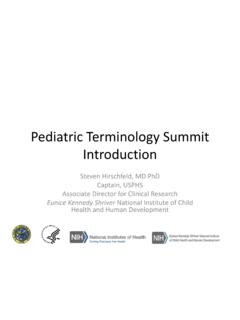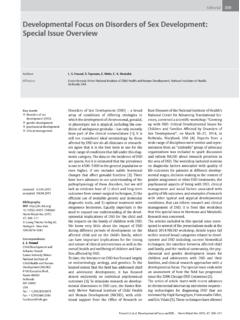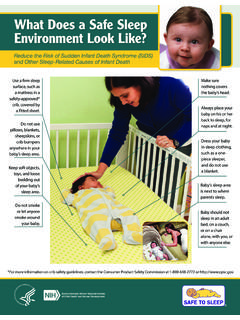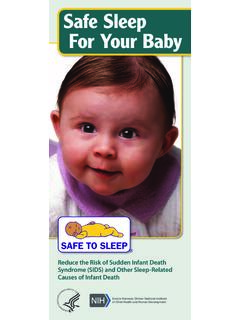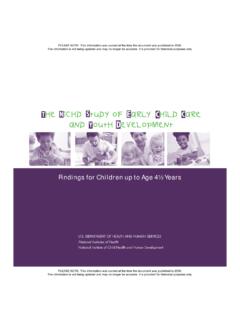Transcription of Child and Adolescent Development Research and Teacher ...
1 Child and Adolescent Development Research and Teacher Education: Evidence-based Pedagogy, Policy, and Practice Summary of Roundtable Meetings December 1-2, 2005 March 20-21, 2006 Co-Sponsored by: National Institute of Child Health and Human Development (NICHD) National Institutes of Health DEPARTMENT OF HEALTH AND HUMAN SERVICES and National Council for the Accreditation of Teacher Education (NCATE) Sponsor Organization Representatives NICHD Representatives Dr. Yvonne T. Maddox Deputy Director Dr. Daniel Berch Associate Chief Child Development and Behavior Branch Dr. Lisa Freund Program Director Child Development and Behavior Branch Dr.
2 Valerie Maholmes Program Director Child Development and Behavior Branch Dr. Peggy McCardle Chief Child Development and Behavior Branch NCATE Representatives Dr. Arthur E. Wise President Dr. Emerson Elliott Consultant Dr. Shari Francis Vice-President for State Relations Dr. Donna Gollnick Senior Vice-President Ms. Jane Leibbrand Vice President for Communications Dr. Antoinette Mitchell Vice-President for Accreditation Dr. Boyce C. Williams Vice-President i Roundtable Participants Dr. James P. Comer (Roundtable Chair) Maurice Falk Professor of Child Psychiatry Yale Child Study Center Dr. Robert Bradley University of Arkansas at Little Rock Center for Applied Studies in Education Dr.
3 Deb Jensen Chair of Teacher Education and Human Performance College of Education Minot State University Dr. Elizabeth Birr Moje Arthur F. Thurnau Professor University of Michigan Dr. Robert Pianta Department of Human Services University of Virginia Dr. Sharon Ramey Director School of Nursing and Health Sciences Georgetown University Consultants Dr. Elizabeth Albro Institute of Education Sciences U. S. Department of Education Dr. Jerry Robbins Professor (former Dean) College of Education Eastern Michigan University Dr. Kathlene S. Shank Professor and Department Chair, Special Education College of Education and Professional Studies Eastern Illinois University Dr.
4 Carolyn Snowbarger Office of Elementary and Secondary Education U. S. Department of Education Dr. Jon D. snyder Dean Bank Street College of Education Dr. Margaret Beale Spencer Graduate School of Education Board of Overseers University of Pennsylvania Dr. Jerry D. Weast Superintendent Montgomery County Public Schools Respondent Dr. Linda Darling-Hammond Professor of Education School of Education Stanford University ii NICHD Research Consultants Dr. Gene Brody Professor Center for Family Research University of Georgia Dr. Jude Cassidy Professor University Of Maryland Dr. Nancy Hill Professor Duke University Dr. Carroll Izard Professor University Of Delaware Dr.
5 Debra Mekos Research Scientist Urban Institute Dr. Fred Morrison Professor University Of Michigan Dr. Philip Rodkin Professor University Of Illinois, Urbana/ Champagne Dr. Barbara Rogoff Professor University Of California, Santa Cruz Dr. Ann Meier Professor University Of Minnesota Dr. Deborah Waber Boston Children s Hospital Department of Psychiatry iii Reflections from the Roundtable Chair The opportunity to participate in the deliberations of this task force was a dream that came true for me. The experience gave me hope. Shortly after our Yale Child Study Center School Development Program (SDP) began work in schools in 1969, I had an occasion to mention that a frightened 8-year-old transfer who kicked his newly introduced Teacher in the leg and ran out was displaying fright-fight or flight behavior.
6 The staff looked at me as if I was speaking a foreign language. The concept was basic knowledge to Child Development , social, and behavioral science professionals. It struck me as unfair to teachers that, through no fault of their own, they had not received the pre-service or in-service preparation that would enable them to understand why children do what they do, and how to manage it in a way that would aid their Development and learning. Over the years, the number of teachers I encountered who had taken Child and Adolescent Development courses in their pre-service training increased to almost all. But even now, few have had applied Child Development courses or experiences.
7 The most powerful moment of our roundtable time together for me occurred when the teachers of teachers identified this major continuing problem We teach them the theory, but not enough about how to apply it. It was this kind of insight that I had long hoped that discussions between Child Development scientists and educators would bring about. Our SDP work was designed to apply Child and Adolescent Development knowledge and skills to practice through a collaborative effort that reduces the vulnerability of the students and the adult stakeholders through guidelines such as no fault problem solving and consensus decision making. The resultant positive building and classroom culture facilitates the achievement of a desirable level of Development , teaching and learning.
8 I was delighted by the agreement among panelists that a good school culture or context is essential. This suggests that an important part of Teacher and administrator preparation should be learning how to work with colleagues, parents, and the community to create a good school culture. The reality, however, is that human beings and human systems resist change even when the benefits are clear. Thus, the concern for me has been how w can create strong motivation and powerful incentives to prepare pre-service educators so that they can support Child and Adolescent Development in practice; and how to support similar change among existing practitioners where necessary. Knowledge and sanctions can promote change.
9 Our NICHD/NCATE-sponsored roundtable was an important step in the right direction. It provided theory and knowledge, evidence from practice, and considered the possible benefits of Child and Adolescent Development accreditation standards and sanctions. This report is a sure-footed beginning toward moving Child and Adolescent Development from the periphery of education thinking to the center; as one participant suggested, as the tree trunk rather than the limbs. Standards, advocacy, accreditation work and the translation of knowledge and skills through demonstration and practice, and more will be needed. But the excitement generated among our roundtable participants make me hopeful that this goal can be accomplished in a reasonable period of time.
10 James P. Comer, , Founder, Yale Child Study Center School Development Program iv A Dean s Perspective First of all, I just want to say what a privilege and a pleasure it was to participate in this roundtable. Clearly, the groups represented on the roundtable have significant overlapping interests (conceptual, programmatic, ulterior, and altruistic). Yet it is an all too rare occurrence for us to have opportunities to sit together to analyze and explore those interests. Just on a personal level, it was the best professional Development I have had in decades. Secondly, I want to emphasize the huge potential for this report in the debate about whether teachers need subject-matter knowledge or knowledge of children, their families and communities or knowledge of pedagogy.
